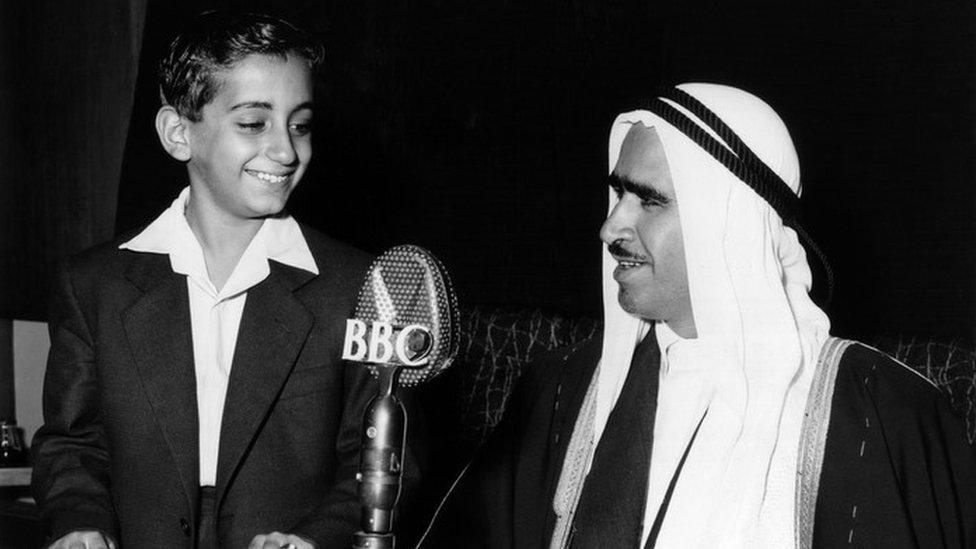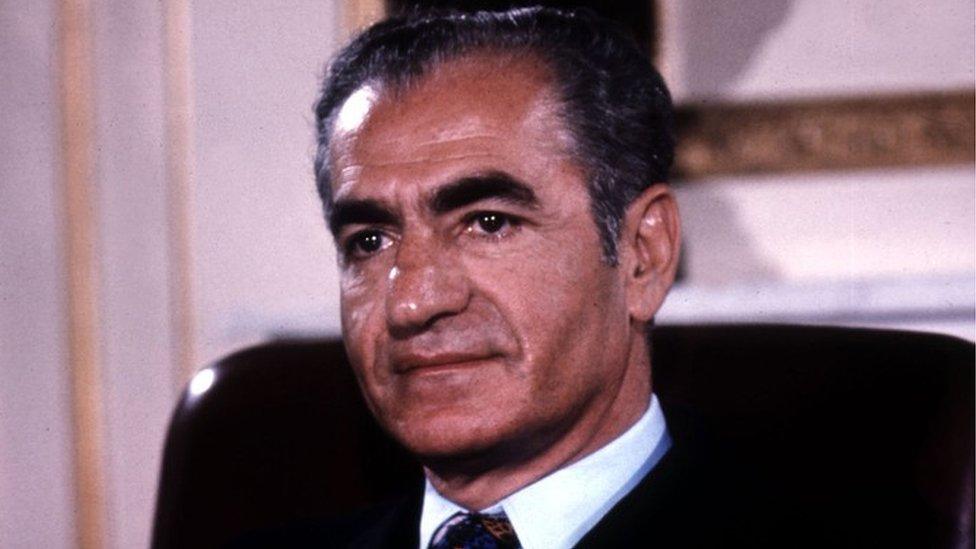Secret deals ending Britain's control in Gulf revealed
- Published

Sheikh Saqr of Sharjah was removed from power in a British-sponsored coup
Secret dealings which brought to an end Britain's empire in the Middle East are revealed in a joint BBC News Arabic and Persian documentary. The film Secrets & Deals: How Britain Left the Gulf contains details of how it left Iran in control of contested islands, as well as eyewitness accounts of a British-organised coup.
The winter of 1967-1968 was a time of crisis for the British economy. Many Arab leaders were convinced Britain had secretly helped Israel to victory over its Arab neighbours in the Six Day War of June 1967. Israel had captured East Jerusalem, the West Bank, Gaza, the Sinai Peninsula, and the Golan Heights.
In retaliation, the oil-rich Gulf states began selling off their holdings of the British currency.
The pound crashed. Desperate to save money, Harold Wilson's Labour government decided it was time to terminate Britain's imperial defence commitments in the Middle East.
Britain never officially had colonies in the Gulf, but it had been the pre-eminent foreign power there since the 18th Century.
The Arab emirates of Bahrain, Qatar and the Trucial States (Abu Dhabi, Dubai, and their smaller neighbours) had signed treaties of protection with Britain.

This meant Britain controlled their defence and foreign policies, while local leaders mostly oversaw local affairs.
In 1965, the most politically, socially and educationally progressive of the ruling sheikhs in the Trucial States, Saqr bin Sultan al-Qasimi of Sharjah, fell foul of the British.
His offence was to have cosied up to Egypt's President, Gamal Abdel Nasser, the mainstay of the Arab nationalist movement.
Sheikh Saqr was removed in a British-sponsored coup d'etat and replaced by his cousin.
Officially, the ruling family agreed he had to go.
Sheikh Saqr was invited to Dubai for a meeting. Britain's local military force, the Trucial Oman Scouts, were waiting. It was a trap, and Sheikh Saqr was sent into exile.
The film reveals how Britain arranged the coup. Sir Terence Clark (later Britain's ambassador in Iraq) told the BBC for the first time how it was done:
"A detachment of our Trucial Oman Scouts arrived. They disarmed Saqr's bodyguards.
"When I saw they were sitting calmly, I told the Deputy Political Resident, 'The message has been delivered'. This was the signal.
"The Deputy Political Resident told Sheikh Saqr that the ruling family had decided to remove him.
"In shock, Sheikh Saqr stood up. He saw his men sitting unarmed. He could do nothing.
"He had to accept the decision."
'We will take these islands'
Once Britain announced in 1968 that it intended to withdraw from the Gulf, tension grew between the Arab leaders and Iran.
The row centred on Bahrain and three small but strategically located islands near the Strait of Hormuz: Abu Musa, and the Greater and Lesser Tunbs.
The Shah (ruler) of Iran's stance on the British withdrawal was firm, according to a secret note recounting a meeting between him and a British minister.
With the exception of what he called "that island", he agreed with granting independence to all the Arab-ruled territories bordering the Gulf. "That island" was Bahrain.
Iran historically claimed Bahrain and the three islands as part of his territory, which was "stolen" by Britain.
What followed was a burst of behind-the-scenes diplomacy between the Arab rulers, Britain, and the Shah.

Britain secretly agreed to hand over disputed islands to the Shah
As Britain's then ambassador in Tehran later recalled in an audio recording never before broadcast: "London said, 'Alright, we'll try this but it's a very delicate operation because we don't trust the Iranians, the Iranians don't trust us, and the Bahrainis don't trust either of us.'"
In public the Shah's attitude changed. He softened his claim on Bahrain, and let the UN take responsibility for the decision that it should become independent, based on a survey carried out in 1970.
By the summer of 1971, the shape of today's Arab Gulf states was becoming clear. Bahrain and Qatar each became fully independent that August, and plans were set for Abu Dhabi, Dubai, Sharjah and four other emirates to establish a new federation called the United Arab Emirates.
But there remained the three disputed islands. They were claimed by Iran but were ruled by emirates that would become part of the UAE in December 1971.
A newly discovered secret note from the Iranian foreign ministry, dated June 1970, records the Shah telling Britain's Foreign Secretary, Sir Alec Douglas-Home: "These islands belong to Iran and must be returned to Iran... No matter what, we will take these islands."
In public, British officials asserted that the three islands belonged to the Trucial States. However, declassified cables uncovered by the BBC reveal that Sir William Luce, a long-term British colonial administrator and diplomat, secretly agreed with the Shah to hand over two of the three islands to Iran before British forces withdrew in December 1971.
The recently declassified documents show that despite the UAE's many subsequent protests about "Iran's occupation" of the three islands on 30 November 1971, Sheikh Zayed of Abu Dhabi and Sheikh Rashid of Dubai - the founding president and vice-president of the UAE - were made aware of Britain's decision before Iranian naval forces moved in.
The documents also reveal that Sheikh Zayed agreed with the decision. The emir of Sharjah meanwhile agreed a last-minute deal with Iran to share the administration of Abu Musa. This lasted until 1992, when Iran took full control of the island.
By December 1971 Britain's presence in the Gulf - the last vestige of its empire in the Middle East - was over.
Today, the UAE still disputes Iran's claim of sovereignty over the three islands. This remains a source of tension between Iran and the Arab world.